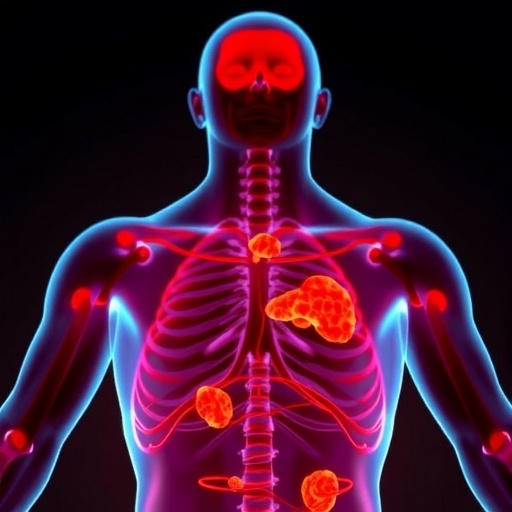In a groundbreaking advance that could redefine cancer immunotherapy, researchers at the University of Michigan have uncovered a novel approach to significantly enhance the body’s immune response against tumors. By targeting two critical genes, CDK12 and CDK13, they demonstrated robust activation of the STING pathway—a key player in innate immunity—effectively turning cold tumors hot and making them far more susceptible to immune checkpoint inhibitors. This discovery ushers in a promising new frontier for tackling cancers resistant to current immunotherapeutic strategies.
Immunotherapy has revolutionized oncology by harnessing the immune system’s intrinsic ability to identify and eliminate malignant cells. Central to this approach are immune checkpoint inhibitors, which unleash T cells—the immune system’s foot soldiers—by blocking proteins that typically restrain immune activation to protect healthy tissues. Despite considerable advances, a significant proportion of cancer patients fail to respond to these treatments, often due to an immunologically “cold” tumor microenvironment that lacks sufficient T cell infiltration and activation.
This study focuses on the cyclin-dependent kinases CDK12 and CDK13, genes implicated in DNA repair and transcriptional regulation. Prior investigations had linked loss of CDK12 to aggressive disease phenotypes in prostate cancer, particularly metastatic forms. Building on these insights, the team conducted sophisticated preclinical experiments that revealed how the simultaneous inactivation of CDK12 and CDK13 induces DNA damage through dysregulated transcriptional processes and DNA replication stress, effectively unleashing intracellular DNA fragments.
.adsslot_Mhi0ZR3BkT{ width:728px !important; height:90px !important; }
@media (max-width:1199px) { .adsslot_Mhi0ZR3BkT{ width:468px !important; height:60px !important; } }
@media (max-width:767px) { .adsslot_Mhi0ZR3BkT{ width:320px !important; height:50px !important; } }
ADVERTISEMENT
What renders this mechanism especially compelling is its ability to sensitize previously unresponsive tumors to immune checkpoint blockade. The research team demonstrated, through the administration of a novel CDK12/13 degrader, that mice bearing tumors with suppressed CDK12/13 expression exhibited enhanced STING signaling and increased T cell-mediated tumor control when treated with checkpoint inhibitors. This convergence of innate and adaptive immune activation holds the potential to overcome resistance mechanisms that plague current therapies.
Furthermore, comprehensive analysis of clinical tumor samples across a variety of cancer types substantiated the preclinical findings. Inactivation of both CDK12 and CDK13 correlated strongly with elevated STING activity and more favorable outcomes following immunotherapy. This cross-cancer relevance underscores the universal applicability of this therapeutic strategy beyond prostate cancer, potentially benefiting patients across a wide oncology spectrum.
At the molecular level, the study elucidates how CDK12/13 regulate the transcriptional elongation of genes necessary for DNA repair and replication. When these kinases are inhibited or genetically inactivated, unscheduled accumulation of replicative stress and aberrant RNA processing occur. The resulting DNA breaks and fragments escaping into the cytosol provide the critical substrates for cyclic GMP-AMP synthase (cGAS) activation and subsequent STING signaling, thereby converting the tumor into a nidus for immune recognition.
The implications of these discoveries extend beyond mechanistic insight. The CDK12/13 degrader molecule employed serves as a prototype for a new class of targeted agents designed to amplify innate immune sensing within the tumor microenvironment. Its combination with approved immune checkpoint therapies could form the basis of clinical trials aimed at enhancing response rates and expanding the therapeutic window for patients with refractory cancers.
Despite promising results, the authors caution that clinical translation requires rigorous validation. Dr. Arul Chinnaiyan, leading the research, highlights the urgency of exploring CDK12/13 degraders combined with immune checkpoint inhibitors in human trials to determine safety, efficacy, and optimal dosing strategies. Should these translational efforts succeed, this approach could recalibrate the landscape of immuno-oncology and solidify a new paradigm for breast, lung, prostate, and other malignancies.
This innovative research also casts a spotlight on the interplay between transcriptional regulation, DNA damage repair pathways, and immunity—a multifaceted axis increasingly recognized as central to cancer biology. By manipulating this axis, researchers can transform immune deserts into immune hotspots, empowering the immune system to execute more effective tumor eradication.
In addition to academic implications, this discovery carries substantial translational potential. Given that several pharmaceutical companies and academic institutions are already invested in developing CDK inhibitors, these findings may accelerate the rational design of combination therapies involving immune modulation. Partnerships between academia, biotech, and pharma will be critical to rapidly deploy this strategy to improve patient outcomes in real-world clinical settings.
Subject of Research: Animals
Article Title: CDK12/13 inactivation triggers STING-mediated anti-tumor immunity in pre-clinical models
News Publication Date: 23-Jul-2025
Web References:
https://doi.org/10.1172/JCI193745
References:
“CDK12/13 inactivation triggers STING-mediated anti-tumor immunity in pre-clinical models,” The Journal of Clinical Investigation
Image Credits: Arul Chinnaiyan
Keywords: Health and medicine
Tags: cancer immunotherapy advancementsCDK12 and CDK13 gene targetingconverting cold tumors to hot tumorsenhancing immune response against tumorsimmune checkpoint inhibitors effectivenessinnate immunity in tumor defensenovel cancer treatment strategiesovercoming immunologically cold tumorspreclinical experiments in cancer researchprostate cancer aggressive phenotypesSTING pathway activation in cancerT cell activation in oncology





